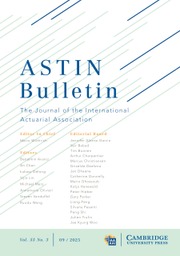No CrossRef data available.
Article contents
Are Flexible Premium Variable Annuities Under-Priced?
Published online by Cambridge University Press: 09 August 2013
Abstract
A variable annuity (VA) is a deferred annuity that allows an annuitant to invest his/her contributions into a range of mutual funds. A separate account termed as sub-account is set up for the investment. Unlike a mutual fund, a VA offers a guaranteed minimum death benefit or GMDB and often offers a guaranteed minimum living benefit or GMLB during the accumulation phase of the VA contract. Almost all the research to date has focused on single premium variable annuities (SPVAs), i.e. it is assumed that an annuitant makes a single lump-sum contribution at the time of issue. In this paper, we study flexible premium variable annuities (FPVAs) that allow contributions during the accumulation phase. We derive a valuation formula for guarantees embedded in FPVAs and show that the delta hedging strategy for an FPVA is substantially different from that for an SPVA. The numerical examples illustrate that the cost in the form of mortality and expense (M&E) fee for an FPVA in many situations is significantly higher than the cost for a similar SPVA. This finding suggests that the current pricing practice by most VA providers that charges the same M&E fee for both should be re-examined.
- Type
- Research Article
- Information
- Copyright
- Copyright © International Actuarial Association 2012


